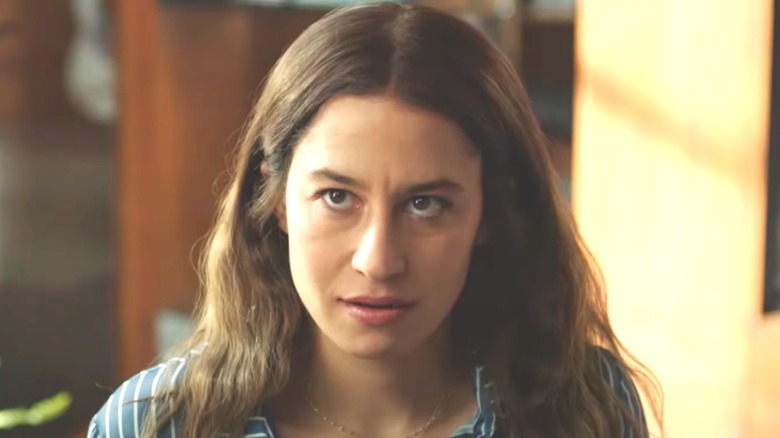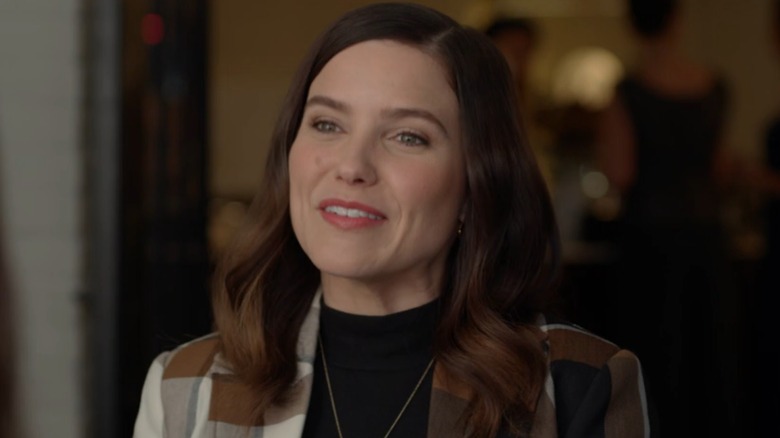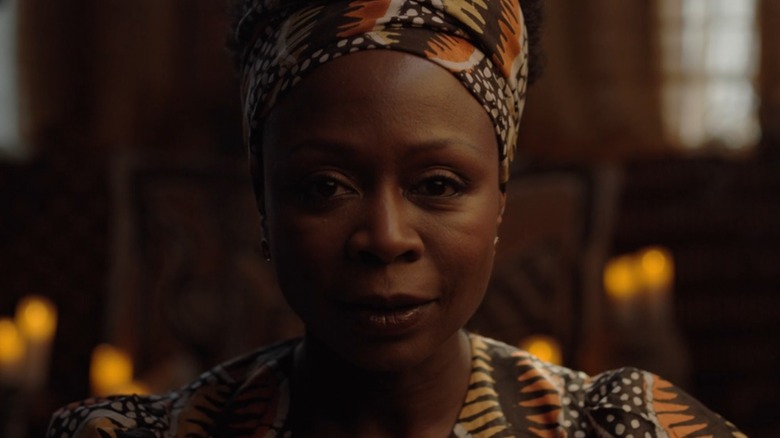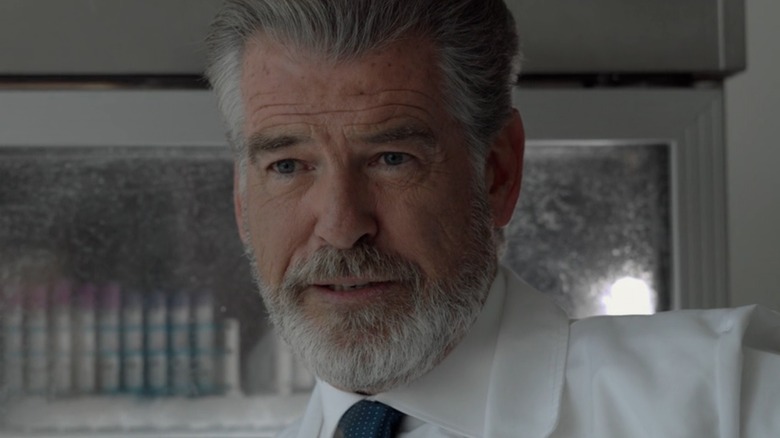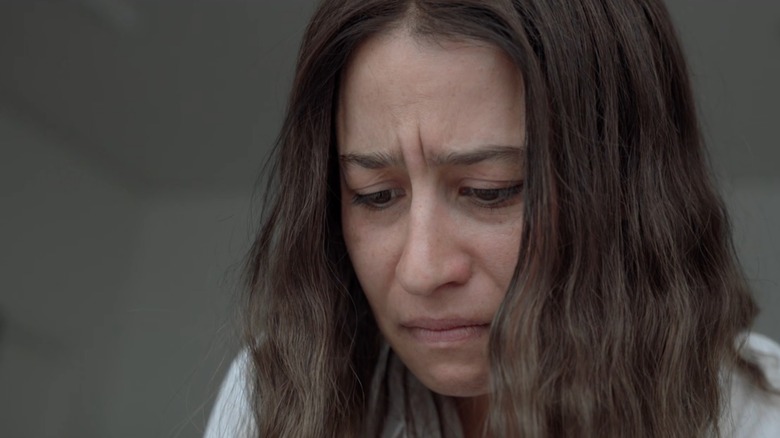The Ending Of False Positive Explained
Lucy Martin (Ilana Glazer of "Broad City" fame) has nearly achieved the mythical state of "having it all." Her marketing career is heating up, she's married to a handsome doctor named Adrian (Justin Theroux, star of "The Leftovers"), and thanks to Adrian's connections, she's about to begin her journey to motherhood after struggling to get pregnant naturally. John Hindle (Pierce Brosnan) is a fertility doctor whose revolutionary approach has produced extraordinary results for countless patients. There's a years-long waitlist for an appointment, but Dr. Hindle happens to be Adrian's former professor and mentor, which puts Lucy right at the top of the list.
Unfortunately for Lucy, "False Positive," which premiered on Hulu on June 25, is a slick psychological thriller, not a feel-good dramedy.
Her appointment with Dr. Hindle is a smashing success. In fact, it results in triplets — twin boys and a girl. After being warned about the potential complications of carrying all three children to term, Lucy makes the decision to undergo selective reduction. While both Adrian and Dr. Hindle insist that she keep the twin boys, Lucy opts to continue with the single girl. She's always dreamed of having a daughter and naming her Wendy after the character in "Peter Pan," a book her late mother read to her frequently when she was a child.
After the reduction procedure, Lucy is plagued by the nagging sensation that something is wrong with her pregnancy. It's not just physical symptoms. She can't help but feel that everyone involved in the process — Dr. Hindle, his disarmingly chipper nurse Dawn (Gretchen Mol), and even Adrian — are hiding things from her. By the film's end, Lucy has discovered that nothing about her pregnancy is what it seems.
Lucy's concerns are disregarded as nothing more than "mommy brain"
As Lucy begins to realize that something is wrong with her pregnancy, she is regularly gaslit by everyone around her into believing that she's being irrational. Multiple characters suggest that she is merely suffering from "mommy brain." Even her seemingly close ally, a fellow expectant mother named Corgan (Sophia Bush) who Lucy meets at a mom group, tries to explain away Lucy's suspicions by saying that she's loopy and delirious because of her pregnancy.
But Lucy is right to be concerned. One of the main tensions of "False Positive" is the fact that Lucy realizes that Dr. Hindle is up to something sinister long before she finds actual evidence to back up her claims. Midway through the movie, she accompanies Adrian to a ceremony where he is going to present Dr. Hindle with an award for his work. While Dr. Hindle delivers his acceptance speech, which is tinged with narcissism and self-importance, the look on Lucy's face is one of disgust. She doesn't know the extent of his villainy at that point, but it's clear that she knows he's not a good guy.
While Lucy listens to her friends and family at first, eventually her suspicions grow too intense for her to ignore. On the other side of the spectrum from "mommy brain" is another trope that is brought up by several characters: "women's intuition." When Lucy leans into her own intuition, she begins to unravel exactly what Dr. Hindle is up to. However, as she learns on her journey, swinging too far in either direction isn't ideal.
The moment Lucy realizes she's not entirely in touch with reality
Just because Lucy's feeling that something is wrong with Dr. Hindle proves to be correct doesn't mean that everything she experiences throughout the film is rooted in reality. Lucy has multiple startling visions that end up being products of her own imagination, as well as an encounter with a woman that exposes the fact that Lucy's perceptions are tainted by her own privilege.
When Lucy turns away from Dr. Hindle, she seeks out a holistic midwife named Grace Singleton (Zainab Jah). Grace, a black woman who wears traditional African clothing and works out of an office lit by candles and decorated with masks and other trinkets, empowers Lucy to push back against the narrative that she should blindly listen to Dr. Hindle. She gives Lucy a crash course on the ways in which misogyny in western medicine has led people to treat pregnancy as they would a disease or disorder to be cured, rather than a complex, but normal, function of the human body.
However, much later in the movie Lucy visits Grace and realizes that she looks quite different. Grace's eclectic office is now modern and slick and she's wearing a business casual blouse. When Lucy questions what happened to her previous appearance, Grace informs her that this is how things have always looked and admonishes her for playing into the "magical Black person" stereotype. In Slate, Matthew Hutson describes this phenomenon as, "These supporting black characters ... use magical powers or sage advice to help struggling white protagonists find themselves and achieve success."
While Lucy is being gaslit by most of the people in her life, her encounter with Grace is one of several examples of when she actually is letting her imagination get the better of her.
Dr. Hindle's plans have been hiding in plain sight
When Lucy finally goes into labor toward the end of "False Positive," all of her suspicions about Dr. Hindle are proven correct. Instead of her daughter Wendy, she gives birth to the twin boys, meaning that Dr. Hindle deliberately went against her wishes during the selective reduction procedure. And when she goes to his office to confront him, she discovers something even more disturbing.
After sneaking her way into a private room, Lucy discovers that Dr. Hindle has been impregnating women not with the sperm of their partner or a selected donor, but with his own. He appears to confront her and says, "When you and Adrian came in here, you said you wanted a baby. I gave you the best genes there are: my own."
There were several clues throughout the film that hinted at these twists. Lucy is occasionally seen looking into a mirror at an angle that makes it appear that there are two of her, which foreshadows the fact that she ends up having twins. And during her first consultation with Dr. Hindle, he even casually says, "Sometimes I wish I could clone myself."
He passed that comment off as a joke, but by the end of the movie, it's clear that he was serious. Dr. Hindle believes that he has a superior intellect that is worth preserving, and he's willing to do whatever it takes to do just that.
Dr. Hindle's megalomania is a specific example of one of the broader themes of the film, namely that misogyny in gynecology has led to a system in which the feelings and concerns of people who actually get pregnant are disregarded by cis-male doctors who believe they know what's best.
The disturbing and surreal ending of "False Positive"
After fleeing Dr. Hindle's office with the underdeveloped fetus of her daughter Wendy, Lucy returns home. She looks at her twin boys, the two offspring of Dr. Hindle that she never wanted or asked for, and picks them up. Lucy walks to an open window and imagines dropping the infants out of it. Instead of plummeting to the street below, the babies float upward, as though they are leaves on the wind.
Later, Adrian comes home, and Lucy hands him the twins, telling him to take them and go. When he does, she takes Wendy and sits down to breastfeed her. In a magical moment, the deceased, underdeveloped fetus begins to move and even latches onto her breast and begins to feed.
Both of these visions that Lucy has involving her children — as well as her earlier delusion about Grace the midwife — could be read as being tied to imagery surrounding the story of "Peter Pan," which recurs throughout the film. Much like the characters in that story, Lucy spends a certain amount of the film in her own Neverland, where she experiences fantastical things that relate to her own world, but are not of it.
However you read the final moments of "False Positive," it is powerful and disturbing imagery that will no doubt sit with viewers long after the film ends.
